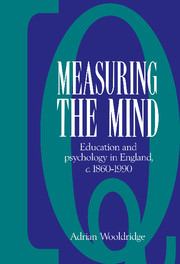Book contents
- Frontmatter
- Contents
- Acknowledgements
- List of abbreviations
- 1 Introduction
- 2 Studying childhood
- 3 The invention of educational psychology
- 4 Cyril Burt and the psychology of individual differences
- 5 Susan Isaacs and the psychology of child development
- 6 The structure and status of a profession
- 7 Mental measurement and the meritocratic ideal
- 8 The psychometric perspective
- 9 Psychologists as policy makers, 1924–1944
- 10 The measurement of merit anatomised
- 11 Equality and community versus merit
- 12 Egalitarianism triumphant
- 13 Cyril Burt and the politics of an academic reputation
- 14 Equality and human nature
- 15 The measurement of merit revived?
- 16 Conclusion
- Glossary
- Selective bibliography
- Index
15 - The measurement of merit revived?
Published online by Cambridge University Press: 11 March 2010
- Frontmatter
- Contents
- Acknowledgements
- List of abbreviations
- 1 Introduction
- 2 Studying childhood
- 3 The invention of educational psychology
- 4 Cyril Burt and the psychology of individual differences
- 5 Susan Isaacs and the psychology of child development
- 6 The structure and status of a profession
- 7 Mental measurement and the meritocratic ideal
- 8 The psychometric perspective
- 9 Psychologists as policy makers, 1924–1944
- 10 The measurement of merit anatomised
- 11 Equality and community versus merit
- 12 Egalitarianism triumphant
- 13 Cyril Burt and the politics of an academic reputation
- 14 Equality and human nature
- 15 The measurement of merit revived?
- 16 Conclusion
- Glossary
- Selective bibliography
- Index
Summary
The revival of psychometric theory coincided with mounting scepticism about the more extravagant forms of progressive education. Based on a belief in children's ability to educate themselves, and sceptical about the claims of adult authority, progressive schooling led to a number of experiments which appalled the conservative public and even gave radical fellow travellers pause for doubt. In both Britain and America policy makers were heavily influenced by a ‘back-to-basics’ movement, with its emphasis on rote learning, examinations, and school discipline; the ethos of effort and the classification of children by merit was once again a popular reforming movement.
The Black Papers versus progressive education
The reaction against progressive education found its most forceful expression in the Black Papers, a series of polemical pamphlets initiated by two English literature dons, Brian Cox and A. E. Dyson. Originally intended to combat radical student interference with academic traditions, the Black Papers soon widened their scope to deal with the ‘general crisis in education’. They attracted numerous wellknown and articulate contributors, including academics, politicians, schoolteachers, and writers. These contributors differed widely in their intellectual and political commitments – some were dyed-in-the-wool Tories, some were habitual Labour voters disillusioned with Labour's educational policies – but they were all united by a common antipathy to the leftward drift of education. They disliked student protests, levelling politics, and permissive ethics; regarded the 1960s as a ‘hideous decade’, in which ‘ill-thought-out notions of spontaneity, self-realisation and equality’ had invaded and subverted education; and insisted on the virtues of high culture, reasoned argument, and disciplined learning.
- Type
- Chapter
- Information
- Measuring the MindEducation and Psychology in England c.1860–c.1990, pp. 384 - 408Publisher: Cambridge University PressPrint publication year: 1994



